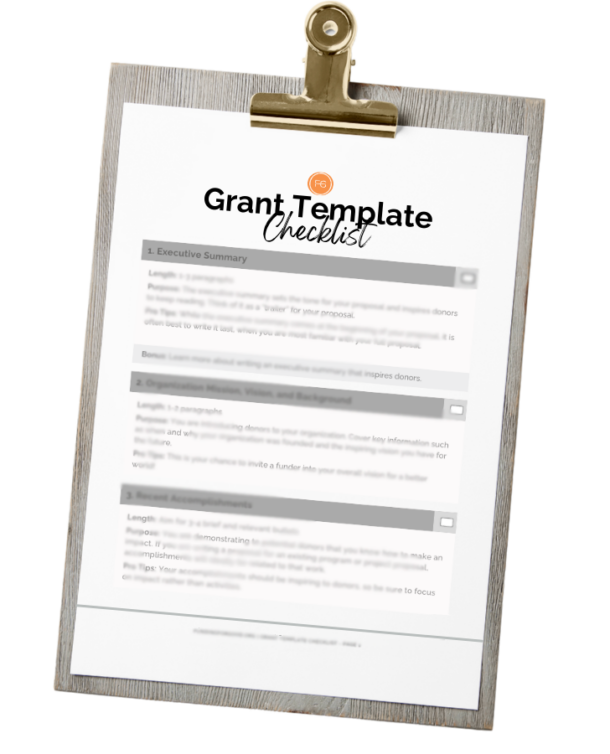by Funding For Good
Ah yes, grants… The saving grace of the perpetually underfunded nonprofit organization! Educating your organization is key.
Money tight? No problem! Just write a grant!
Expanding a program? There’s a grant for that!
Need to add a full-time staff member? Grant time, baby!
We should be educating our organizations. If we’re honest with ourselves, as the leadership of nonprofits, we are probably all a little guilty of thinking this way from time to time. Grants are a great thing, and there are a lot of them out there, but there are some misconceptions about how to utilize them (more on that here, here and here). That’s a pen in your development director’s hand, not a magic wand! Educating your organization about grants is important.
The truth is, most of your organization’s leadership team, program staff, and board of directors likely don’t understand exactly what grants are. Educating your organization is key. Essentially, the perception is that there are hundreds of buckets of free money that you can dip into any time you want. As a development professional, you are probably aware of the reality, but the challenge is educating your organization in order to maximize your return on investment when writing grants.
Once when I was employed as a development director, I was sitting in my office, and a frantic employee knocked on my door. When this person came in, they said “One of our washing machines just stopped working. I asked what to do and (our boss) said to come tell you to write a grant for a new one.”
If only it were that simple.
If you’ve been involved in fundraising for a nonprofit organization, you probably have a similar story. This was not anyone’s fault; it was just an example of the lack of understanding regarding grants – what they are, how to apply for them, what is needed, how to plan for them, etc. This is where you as a development professional, must put on your “educator” hat to help your colleagues understand what grants are all about. Educating your organization is so important.
Communicate
Communication is an underlying theme in many of our communications, and every conversation with clients. It always sounds like such a simple thing but is overlooked almost every single time.
Let’s start at the top – does your Executive Director/CEO understand how grant funding works? Looking at the washing machine example from above, no one is at fault; it’s a simple lack of communication. The Executive Director, who was tasked with finding a solution to an urgent need, was simply suggesting a way to meet a need. It’s your job to educate your organization’s leadership on best practices for grants writing.
Build Relationships
(it’s the most important part of all fundraising)
Whether you are new to your organization or you’ve been there for years, it’s never a bad time to build relationships with your coworkers. Work can get crazy – deadlines, goals to meet, fires to put out – I get it! However, let me encourage you to block off some time on your calendar each week to spend with different program managers and staff. This does not need to be a significant chunk of time; you will find that spending as little as 30 minutes can make a world of difference in building a mutual understanding of each other’s responsibilities and visions. Work beside them, ask them questions, understand what they do and why they are there.
Don’t assume anything.
Assumptions absolutely halt progress. Have you ever found yourself thinking, “no one at this place understands my role”?
Honestly, you’re probably right. However, you are likely making similar assumptions of everyone else. Do you really know what that program director does? Invest your time with the people you are working with every day and you will not only have a thorough understanding of what they need, you’ll also find yourself becoming much more well-versed on your organization as you talk to donors and program officers.
Develop a Strategy to Communicate with Staff
This is going to look different for every organization, but it is critical. Structure varies from one nonprofit to another, so you need to determine what works best for you. With a smaller staff, it may be best to communicate your grant strategy with each colleague one on one. If you are part of a larger organization, you may have to ask for time in a monthly staff meeting, or trust in your leadership team to disseminate your message to their program staff.
There are several things that everyone on your staff must understand. By keeping these simple, we can avoid overwhelming them with information.
- Grants are never a solution to an urgent need. Briefly explain that grants are funded in predetermined cycles and that the process from start to funding can take between six and nine months.
- Needs lists are critical. Grants are not just pools of money for whatever you need at the moment. Make sure to communicate that the entities providing funding have priorities that must align with your organization’s request and overall mission. Stress that if you have a needs list from each program, the likelihood of a successful grant proposal increases dramatically.
- Develop a timeline with each program. As you are discussing the needs list with them, lay out a rough timeline to outline when they anticipate needing funding and when each project will begin and end.
- Set clear expectations. Make sure that each key staff member understands some common items that funders will request. Things like project budgets, expected outcomes, demographics, etc. If they are prepared, the proposal process will be much less stressful.
Share Results
(And celebrate successes!)
Whether your request is for $500 or $500,000, make sure to keep the pertinent staff and leadership updated on the request. If you get the grant, celebrate it together! If you don’t, it is your job to seek feedback from the foundation and communicate that information to your team. Make sure that they understand the reasons that your proposal was successful or the reason that it was not. In order to keep the lines of communication open, it is crucial to update your team on every proposal that you submit.
Grant funding is an awesome resource to take advantage of for most nonprofits. There are private foundations and government entities who are likely a strong match for your organization and its needs. So, take the initiative to communicate and build relationships with your coworkers, develop a strategy, and take your organization to the next level!
If we can help with Grant Writing and Research Support or Development Coaching, let us know. Maybe you just want a few hours of consultation with one of our nonprofit experts – we can help. You may also find some Upcoming Events to attend or helpful information in our Free Stuff section. As always, Keep Growing for Good!


